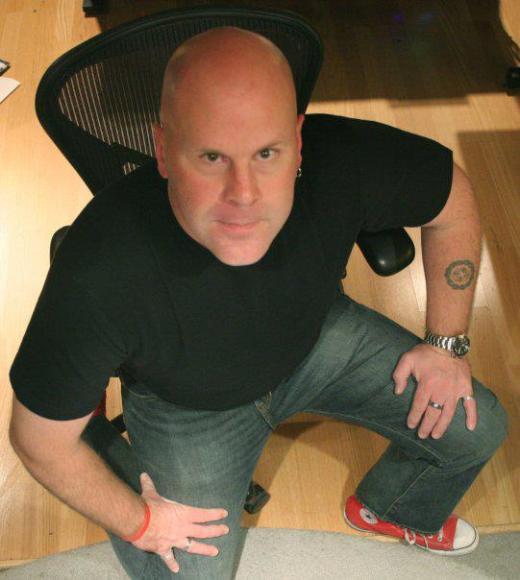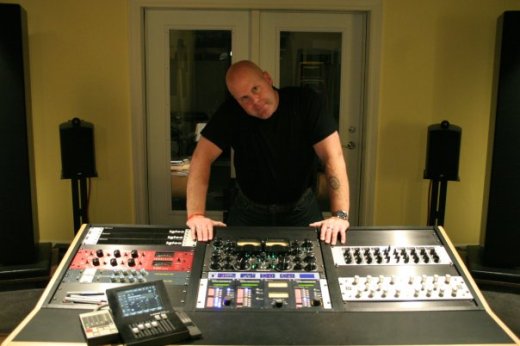This post is about mastering your audio. In case you don’t know what that’s about…Trevor, below, is going to explain it to you. Coyote Love Entertainment sends all our professional audio productions to separate mastering facilities. Trevor’s studio is one of many that you can send your mixes to if you want them to POP.
Greetings to Trevor Sadler of Mastermind Productions.
Trevor you’re a mastering engineer who was recommended to me by someone years ago with impeccable ears. In 2009 you mastered the debut CD of my “Coyote Love” project, and you’ve just worked on our cover of “Blame It.” I have to agree that your work is great.
Haha – thank you so much. I appreciate the kind words, and your experience is how I get most of my work – people are either recommended by others they trust or have heard my work on a project they love.
For those who don’t know…What is a Mastering Engineer? What do you do?
There are three general stages of creating a recording: the actual recording/overdub process, the mix process, and the mastering process. That purpose of the mastering process is threefold: 1) to make the mix of each song sound as good as possible through sonic manipulation and enhancement, 2) to make the mixes sonically consistent from song to song on the project, 3) to make sure the songs have good sonic translation on various playback systems so they sound as good as possible, no matter where they are played.
How many years have you been a mastering engineer?
I started mastering in 1994…. so 19 years.
How many years before that were you working with audio?
I started being around studios around 1989.. so 5 years. I went to the Music Industry Arts program at Fanshawe College, in London, Ontario. It’s one of the most highly regarded audio programs anywhere – a lot of good engineers and producers have come from there.
What is the scope of clients you work with?
Unlimited!!!! Over the years it’s been the most indie of indie projects all the way up to some pretty serious label stuff, and everything in between, in all genres of music, and even some non-music types of things (such as restoring 911 response audio, or wiretap audio for the police).
Why are recordings mastered?
I’d say to the two main reasons are to double check the quality of the mix in a different listening environment, and with a different engineer that brings a fresh set of ears to the project, and also to do subtle enhancements to the mix to not only make it sound better, but make sure it translates as well as possible on different playback mediums once it’s out in the real world.
Why do people send music out to be mastered instead of doing those things at the same studio where the music was recorded?
Two main reasons: a fresh set of ears (from the mastering engineer) and a studio that is specifically set up for the purpose of mastering. I would say of the two, the fresh set of ears from an experienced mastering engineer is the more important.
What sorts of devices do you use in the quest for great sound?
I personally use both analog and digital processing, and I encourage clients to send me as high resolution mixes as possible for me to work from. I routinely work from analog tape or DSD or 24bit/96k digital, and then process with different analog and digital devices. Just like with anything in audio, there is no one magic “secret weapon”, but different gear will have strengths and weaknesses and be appropriate for different tasks. As an example, if I want to warm up a recording, or add some really pretty sounding top end, I’ll go to an analog eq. If I wanted to zone in on a very specific problem frequency, I’d use a digital eq.
So much today is done digitally. Almost all the stuff we’ve sent you was recorded at a fairly low bit-rate, compared to what is available today. What is your most powerful weapon of choice when warming up digital recordings? Or is it a combination of things?
This is where analog processing can be your friend… a lot of times I’ll bounce stuff off tape, or use a tube compressor.. things like that, that help shave the “edge” off of low-res digital.
Do you have favorite source material to get? What format, and, if digital, what Bit and Sample rates do you like best? Or do you care at all?
I would have to say I’m not too particular on format, although if I had to pick one it would be DSD. More importantly, I prefer good, solid mixes that the artist and engineer and producer are happy with. A mix can come in super high resolution, but if it’s a bad mix that won’t help it!!
What has changed the most about the job description of a mastering engineer between, say, 1963 and 2013?
Originally (back in the days of vinyl) recordings were mastered so that they would sound good playing back off the record. Vinyl has some serious limitations, for instance, in terms of how much low frequency or high frequency it can handle. The mastering engineer would make sure the final mix would translate to the vinyl. As mastering evolved, mastering engineers were given more creative freedom to polish the mix and make improvements on the sound. These days, with digital recordings, very little has to be done from a mastering standpoint to prepare for the delivery medium, but mastering is still used as that final step to polish and perfect the mix.
Do you master for vinyl? Is there a different approach to mastering for vinyl?
I do master for vinyl, and that is the one medium you MUST master for (in theory, you don’t HAVE to master for the digital medium — it’s just a good idea so your music sounds as good as it can). Again, with vinyl, if you don’t watch your low frequency content you could actually cut a skip into the record… or too much high frequency and cause serious distortion on playback. There are a lot more “rules” for vinyl mastering.
Does Classical Music/Orchestral Music get mastered too?
Some of it does, and some of it isn’t… it really depends on what the producer or artist wants to do. Even when classical/chamber music is mastered, it’s a very minimalist process. The approach of classical recording is a much more “purist” process – where you are just capturing what is there, and nothing more. You are not expected to “enhance” anything.
There are a number of mastering plugins and mastering plugin “suites” from basic to quite high-end. A lot of people are opting to use those and consider their music mastered. What is the advantage of sending your music through a mastering studio like Mastermind Productions, rather than just running your mix through a plugin that claims to do the same job?
Again, the single biggest thing is not the gear, but then engineer you are hiring – that will have the biggest influence, but of course the gear plays a big role as well. There are some plugins that are very good, and I do use a few myself… but I’m using them in a studio with an amazing monitoring environment (so I can hear what I’m doing down to the last detail) and alongside some awesome analog and digital outboard gear. I have tried myself to master a song with only plugins, and I can’t do it. I can’t make myself happy and I can’t get the sound I’m looking for.
A respectable mastering plugin suite (of plugins) can be bought for $500-$1500 or found illegally for free on the Internet etc. What is the ballpark cost of the chain of equipment one’s audio goes through at your facility, including monitors, cables, the works?
If you include the monitoring chain, and you really have to because even though that’s not part of the processing chain, it’s what allows you to make “informed” decisions on what and how to process, I’d say $50,000.
How much does it cost, on average, to build a listening environment like yours?
I’d say if you wanted to duplicate my room, with all the gear and the acoustic treatment, close to $100,000. I think if you wanted to make a basic, no frills mastering room you’re still going to spend $25k, and certainly, people have spent a lot more than $100k!!!
I’m starting to get the picture. With all that experience, expensive equipment, and custom listening environment. How does homespun indie producer like myself, who already spends alltheir lunch money on the recording process, even afford a guy like you?
The good news is, quality mastering is more affordable these days than you might think, regardless of your budget…. although I think for a full project you’re still going to have to spend at least $500 or so…. that’s really not that much when you consider the impact it can have on the finished project. The important thing to do is look around at different mastering engineers and studios and find someone you like to work with… either through references from other producer/engineers, or from another project you like the sound of.
Does the client have any say in the approach you take to mastering a song or group of songs/CD etc?
ABSOLUTELY! When you hire a mastering engineer you are for sure hiring their expertise, but in the end, it’s still your project. If you don’t like the way something sounds, tell the mastering engineer and he’ll change it, or come up with something different.
Well now that we know that pro mastering does indeed costs money, but that you can still have it done on a budget with conscientious guys like you willing to help out…maybe our readers will think twice before taking their blood sweat and tears and sending them through a mere mastering pluggin.
I hope so!!!!!
For someone in a pinch who is compelled to use a pluggin or suite of plugins…is there a pluggin or sweet that you think yields decent results? Or theoretically should yield decent results?
There really isn’t. And again, it’s not the plugins are all bad…. but that’s just one part of the equation. The other part is having the monitoring environment to judge the mix, and the final part is how do you “erase” the mix you’ve been living with out of your memory so you can approach it with a fresh set of ears? It’s these things that will make a big difference.
Personal favorite recording(s) you have mastered in the past?
All of the work I have done for the Felix Culpa – an absolutely extraordinary band that I just adore.
After that…. I’m not sure. There’s a TON of cool stuff I’ve had the pleasure of working on… I could make a pretty long list!
Which of your pieces of equipment has the most
sentimental value and why?
My Avalon 2077 Mastering EQ… you’d have to rip it out of my cold, dead hands!
Lastly, I’m kind of a big hippie so I have to ask…What sign are you?
lol!!! I’m a Pieces sun sign, with a Virgo ascendent. I guess that means I’m creative…. but also detail oriented! Probably a good mix for someone like me I suppose!!!!
To learn more about Trevor Sadler and Mastermind Productions go to http://www.mastermindproductions.net/
Peace through music,
Hank Coyote Wagner



